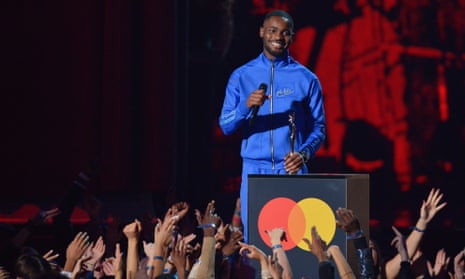Dave’s performance of his song Black at the Brit awards marked the moment that grime truly gave full-throated and undeniable voice to the politics of black Britain.
The track by itself would have been powerful enough, but his improvised condemnation of Boris Johnson as a “real racist”, commentary on Windrush, reparations, Grenfell and tribute to London Bridge victims Jack Merritt and Saskia Jones made the moment a landmark for the music of black Britain.
Stormzy has led the way in denouncing the Conservative government on his tracks and in public, as well as showing a total lack of fear in declaring Britain to be the racist nation it is. Just last week I was one of thousands in Birmingham bumping along at the tour for Kano’s album Hoodies All Summer, as the sampled voices of former British Black Panthers Altheia Jones-LeCointe and Darcus Howe blared through the speakers. Across the genre, political commentary is laced through the music, from Ghetts’s dedication to black women on his song Black Rose to Little Simz’s anthem for the underprivileged, Pressure.
All music is political, and grime is no different. In embracing the reality of the streets and the struggles that are too often a feature of black life in the inner cities, it provides a voice for those on the margins. The sound, lyrics and aesthetics of grime have empowered a whole generation. But much like gangsta rap in the US, grime has largely been trapped in what Tupac called Thug Life: hyper-masculine, sexualised and violent imagery. The problem is that this can create a feedback loop, where it becomes the representation of blackness, reinforcing the link between black people and urban crime.
As someone whose political education began with early American hip-hop, it is affirming to see the strong emergence of black political voices in British music. Artists such as Public Enemy, KRS-One and Tupac were more important to my intellectual development than any academic text. Common’s A Song for Assata introduced me to the exiled Assata Shakur, living in political asylum in Cuba, and the radical politics of her era. British artists putting out political tracks is not new, rappers such as Akala, Ms Dynamite, Klashnekoff, Lowkey and too many others to count have been expressing messages in their music for decades. The difference now is that the messages in the music are in the mainstream, proving you don’t have you lose your voice as you leave the underground.
That artists such as Stormzy, Dave and Lil Simz have their roots in west Africa is also a new dimension. Gone are the days of a strong distinction between African and Caribbean among black Brits, with a common blackness being affirmed by the young generation. #Grime4Corbyn, which saw artists and fans rally around the Labour party, showed the potential for music to mobilise political action, but the key is to build on the momentum.
As we saw with hip-hop, while the medium represents the voices of those on the margins, the industry also tends to commercialise and, therefore, undermine radical messages. Respect to all of the artists empowering a new generation of black people emerging from Britain: this is only the beginning of the next stage of the struggle.

